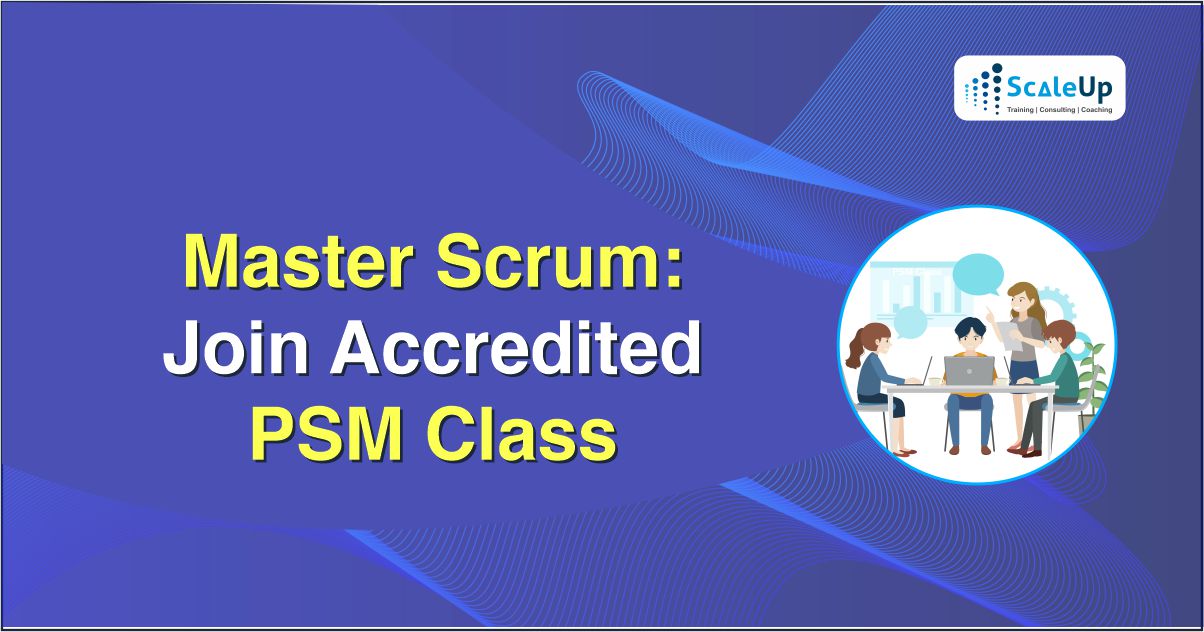Introduction:
Becoming a Professional Scrum Master (PSM) is a significant milestone for individuals aspiring to excel in Agile and Scrum.
The Professional Scrum Master (PSM) certification, offered by Scrum.org, is a globally recognized accreditation that validates your expertise in Scrum principles and practices. In this step-by-step guide, we’ll walk you through the process of earning your PSM certification with ScaleUp Consultants and unlocking new opportunities in Agile.
Step 1: Understand the Basics of Scrum
Before diving into the certification process, it’s crucial to have a solid understanding of Scrum. Familiarize yourself with the Scrum framework, accountabilities (Scrum Master, Product Owner, and Developers), events (Sprint, Sprint Review, Sprint Retrospective, and Daily Scrum), and artifacts (Product Backlog, Sprint Backlog, and Increment).
Step 2: Choose the Right PSM Level
Scrum.org offers three levels of Professional Scrum Master certification: PSM I, PSM II, and PSM III. Decide which level aligns with your current knowledge and career goals. PSM I is an entry-level certification, while PSM II and PSM III are for more advanced practitioners.
Step 3: Study the Scrum Guide or enroll in a PSM workshop with a certified Professional Scrum Trainer (PST) from Scrum.org
The Scrum Guide is the official document that defines the rules of the Scrum framework. Thoroughly study the latest version (November 2020) of the Scrum Guide provided by scrum.org. Pay close attention to the accountabilities, events, and artifacts, as your certification exam will be based on this foundational document.
If you do not want to opt for the self-study route, enroll for a workshop by registering via Scrum.org with a certified professional Scrum trainer.
Step 4: Explore Scrum.org Resources
Scrum.org offers a variety of resources to help you prepare for the certification exam. Take advantage of their official Scrum Open assessments, which simulate the PSM-I exam environment. Additionally, explore their learning paths, webinars, and blog posts to enhance your knowledge and understanding of Scrum.
At ScaleUp, we provide our students with the Scrum visual guide, copyrighted content of Vineet Patni (who holds both PST and CST accreditations), and comprehensive self-assessments for our students to practice before the actual PSM exam.
Step 5: Enroll in Scrum Master Training
Consider enrolling in a Professional Scrum Master (PSM) training course. Scrum.org provides official training courses that cover essential topics and provide valuable insights from experienced trainers. Attendees of these courses often receive a voucher for the certification exam as part of the training package.
Step 6: Practice with Open Assessments and our comprehensive self-assessments
To gauge your readiness for the certification exam, take the Scrum Open assessments available on scrum.org. These assessments are in the format and difficulty of the actual exam, allowing you to identify areas for improvement and build confidence.
Step 7: Schedule and Take the Exam
Once you feel adequately prepared, schedule your PSM certification exam through scrum.org. The exam is taken online and consists of a series of multiple-choice questions. Be sure to read the exam guide provided by scrum.org for details on the format, duration, and passing score.
Step 8: Embrace Continuous Learning
After successfully earning your Professional Scrum Master certification, your journey with Scrum doesn’t end. Embrace a mindset of continuous learning and improvement. Stay updated on the latest developments in Agile and Scrum, you can be a part of our 3000+ agile community and consider pursuing advanced certifications like PSM II or PSM III to enhance your expertise further.
Conclusion:
Becoming a Professional Scrum Master through Scrum.org is a rewarding journey that requires dedication, practical experience, and a deep understanding of Scrum principles. By following these stepwise guidelines, you’ll be well-prepared to earn your certification and embark on a fulfilling career as a Scrum Master.
Good luck on your journey towards becoming a certified Professional Scrum Master (PSM)








